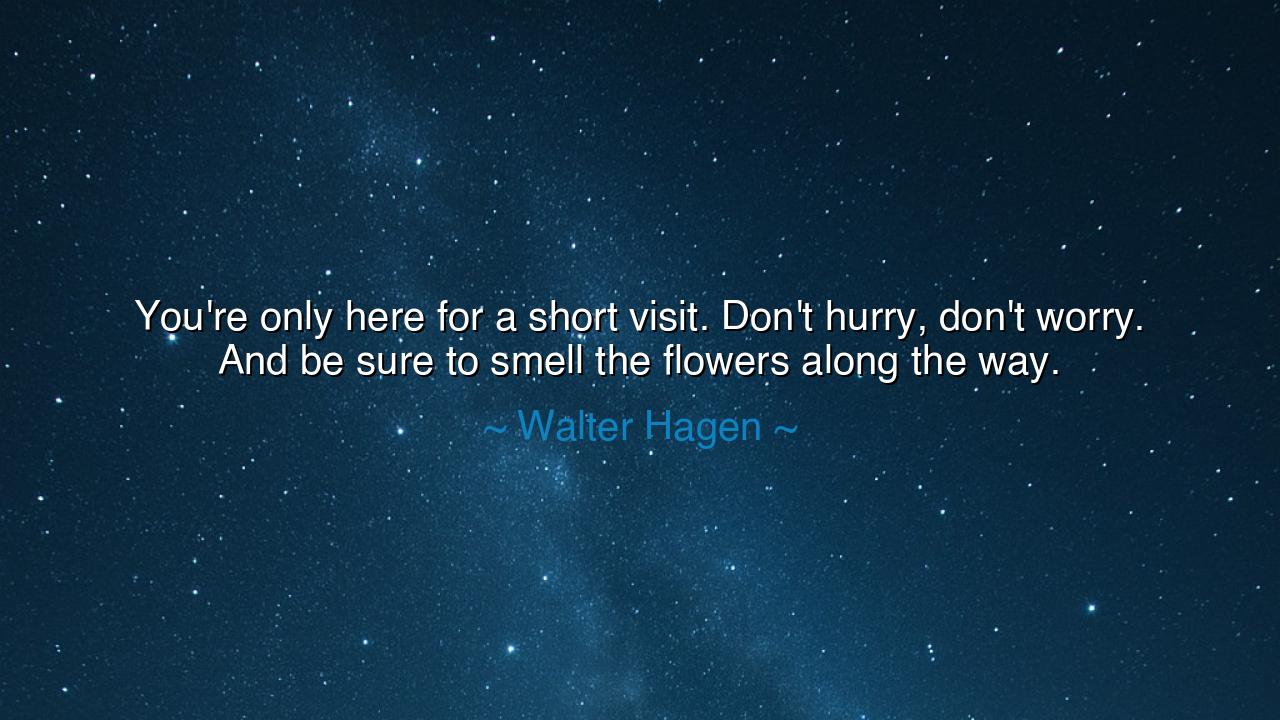
You're only here for a short visit. Don't hurry, don't worry. And
You're only here for a short visit. Don't hurry, don't worry. And be sure to smell the flowers along the way.






“You’re only here for a short visit. Don’t hurry, don’t worry. And be sure to smell the flowers along the way,” said Walter Hagen, the great golfer whose words echo not of sport alone, but of life’s fleeting nature. These are not the idle musings of leisure, but the quiet wisdom of one who has looked upon the swift passage of days and learned that the greatest victories are not measured by trophies, but by moments truly lived. His words carry the rhythm of eternity — a reminder that we, travelers upon this earth, are but guests for a breath of time. The ancient poets knew this truth well: that to live beautifully is better than to live long, and to pause is sometimes wiser than to rush.
In the stillness of reflection, one hears the whisper of Hagen’s teaching. Do not hurry — for the rushing man is blind to wonder. He may reach his destination swiftly, but he will not remember the path. The hurried heart forgets the color of the dawn, the laughter of friends, the warmth of the sun upon the skin. Do not worry — for anxiety borrows sorrow from the future and casts shadows upon the present. The worrier dwells in battles that may never come, while the wise dwell in gratitude for what already is. To smell the flowers is to open the senses to life — to find joy in the simple, to see beauty not as an interruption, but as the very essence of living.
Consider the story of Siddhartha Gautama, who would become the Buddha. Born into wealth and privilege, he was surrounded by luxury but not peace. He hurried after knowledge, sought truth in austerity, and wrestled with the world’s suffering until, beneath a tree, he simply stopped. In that stillness — in the absence of hurry and worry — he awakened. He saw that life, though brief, is sacred; that peace is found not in grasping, but in being. Walter Hagen’s words are the echo of that same enlightenment: that to live rightly is not to chase time, but to walk gently through it, attentive and aware.
There is a certain courage in slowing down. The world shouts, “Go faster! Achieve more!” But wisdom whispers, “Be present.” The ancients spoke of ataraxia — the serenity of a soul untroubled by the storms of fortune. The man who hurries through life chases shadows; the man who pauses sees the light that casts them. When we stop to “smell the flowers,” we honor existence itself. Each bloom, fragile and brief, mirrors our own mortality. To notice it is to bow before the miracle of now.
Think of Marcus Aurelius, emperor of Rome, ruler of armies, yet philosopher of calm. Amid the weight of empire, he wrote, “Do not act as if you were going to live ten thousand years.” Even he — with legions at his command — knew that life’s grandeur lies not in its length but its depth. Like Hagen, he understood that we are all but visitors, wandering through a garden that will outlast us. The wise traveler gathers no trophies but memories; no riches but peace of heart.
To not hurry is not to abandon ambition, but to pursue it with grace. To not worry is not to ignore challenge, but to trust the rhythm of life. To smell the flowers is to remember that joy is not a destination — it is the fragrance that accompanies the journey. The hurried man says, “One day I will rest.” The awakened man says, “This moment is rest enough.” Every breath, every laugh, every glance at the sky is a gift from the divine.
So, dear listener, what should you learn from Hagen’s gentle wisdom? Guard your time, but do not chain it. Work, but pause. Strive, but breathe. When you walk, notice the song of the wind. When you speak, speak with kindness. When you love, do so fully. Let no day pass without gratitude, no sunrise without admiration. You are indeed here for a short visit — so make it a graceful one.
And when your journey nears its twilight, may your heart be light — not with the weight of unfulfilled haste or unending worry, but with the fragrance of all the flowers you stopped to smell along the way. For it is not the distance traveled that defines a life, but the depth with which it was truly lived.






AAdministratorAdministrator
Welcome, honored guests. Please leave a comment, we will respond soon